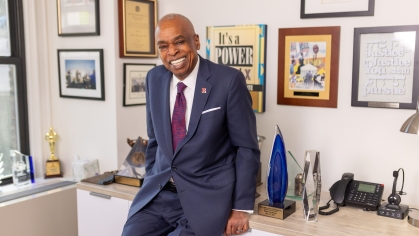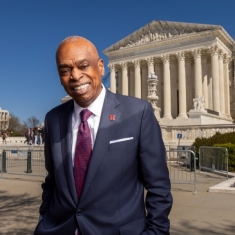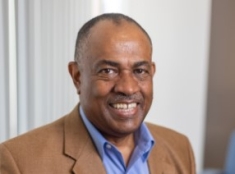A Leader in the Fight for Rights

Wade J. Henderson, who will be inducted into the Rutgers Hall of Distinguished Alumni, has been a champion of civil and human rights for decades.
Soon after Wade J. Henderson turned 15 in the spring of 1963, he planned to buy a new suit for his upcoming middle school graduation ceremony using money he had earned delivering newspapers in his Northwest Washington, D.C. neighborhood. “I decided to go to the city's most expensive department store,” says Henderson NLAW’73.
“I picked out a suit, went up to the counter, and I asked the salesman to point to the dressing room so I could try the suit on,” he says. “The salesman looked at me derisively and said, ‘You know Negroes can't try on clothes here at Garfinckel’s!’ He burst out laughing, as did many of the store’s patrons. I was so humiliated.”
Henderson says he dropped the suit and ran from the store. “When I got outside, I was so angry with myself for that reaction. I realized, ‘Oh hell no! Discrimination is not for me. I don't like it, and there's no reason for it. I'm going to have to bring about some changes doing what I can to make that happen.”

That moment 61 years ago was pivotal one for Henderson, who was inspired by landmark events that year, including the March on Washington, which he attended and heard Martin Luther King Jr.’s “I Have a Dream” speech. Other events that motivated him that year included the Children’s Crusade in Birmingham, Alabama—where children were blasted with fire hoses and attacked by police dogs—and the Birmingham church bombing that killed three 14-year-old girls and one 11-year-old girl.
He would go on to Howard University for his undergraduate degree and then Rutgers Law School in Newark, which served as his foundation for a renowned career of more than 50 years as a civil rights leader and attorney. He served as president for 21 years of The Leadership Conference on Civil Rights and Human Rights, a coalition of more than 230 national organizations that has influenced passage and implementation of every major civil rights act since 1957. Previously he’d served in leadership roles with the NAACP, ACLU, and the Council on Legal Education Opportunity (CLEO).

Photos of Henderson with presidents from both political parties celebrating laws he helped create—including the Voting Rights Act reauthorization of 2006, the Fair Housing Amendments Act of 1988, and the Simpson-Mazzoli Act in 1986, which was the last major bipartisan immigration measure passed by Congress—fill the walls of his office near the White House.
“I came along in an interesting time where change was needed, and the possibility of achieving that change was undeniable,” says Henderson, who retired from The Leadership Conference presidency in 2017 but remains active in civil and human rights causes. He will be inducted into the Rutgers Hall of Distinguished Alumni on April 25.
From D.C. to Rutgers
Rutgers had not been on Henderson’s radar until 1969 when he attended a protest rally outside the U.S. Supreme Court in support of U.S. Rep. Adam Clayton Powell, who was appealing his expulsion from Congress. There he saw Powell’s team of attorneys, led by Arthur Kinoy, a legendary Rutgers Law professor and an influential constitutional law attorney on the national stage.
“When you heard Arthur speak, you then realized, ‘Oh my, this is something special,’” Henderson says. “He had a booming voice. He also had such a powerful way with words and such an evocative way of bringing to life a system of injustice. He was absolutely mesmerizing.”
Henderson, then a Howard student, added Rutgers to his list of potential law schools, and ultimately enrolled with the aid of the school’s then fledgling Minority Student Program.
At Rutgers Law, Henderson grew close to Kinoy, as well as Professor Al Slocum, a Rutgers Law alumnus and a founder of the school’s Minority Student Program. “I have to say Al Slocum was an extraordinary influence on my life,” Henderson says. “He remains to this day the north star that I look to for guidance that I'm pursuing the right path.”
Henderson also audited a class taught by the late Supreme Court Justice Ruth Bader Ginsburg, a faculty member for nearly a decade, and was inspired by her advocacy of women in the law. “Ruth Ginsburg was groundbreaking,” he says. “She was very conscious of her role as one of the few women in the law.”
When Henderson was preparing to graduate, the dean of Rutgers Law School in Newark asked him if he would stay to become an assistant dean and director of the student minority program. “I'm very honored to have been a graduate of the Minority Student Program, and I'm especially honored that I was asked to be its first director,” he says, noting that it gave him the opportunity to work closely with Slocum. “I knew what it had meant to me to be a student with a support system that the law school provided.”
A Half-Century of Civil Rights Leadership

After two years directing the program at Rutgers, Henderson returned to Washington to leadership roles at The Council on Legal Education Opportunity (CLEO), a position he held from 1976 to 1980. In 1981, he served as counsel and associate director of the ACLU Washington National Office. In 1991, he became the Washington bureau director of the NAACP, serving as principal lobbyist and national policy director. He fulfilled the NAACP role until beginning his tenure as president of The Leadership Conference in 1996.
In addition to key legislation he has helped to become law, he is proud of speaking on behalf of the NAACP against the nomination of Supreme Court Justice Clarence Thomas in 1991 and in support of the nominations of justices Sonia Sotomayor in 2009 and Ketanji Brown-Jackson in 2022.
Henderson, who has stressed the importance of political bipartisanship throughout his career, says he looks forward to the nation coming out of its current divisiveness. “We are living in a very toxic period where political views have been distorted by misinformation mischaracterization,” he says. “I recognize that history moves in cycles. I hope that what we're experiencing now hopefully will be a short cycle and that we'll be able to see an opportunity for change.”
He says he is honored to be inducted into the Rutgers Hall of Distinguished Alumni. “It is both humbling and exhilarating,” he says. “It reaffirms my belief that a career in civil and human rights promoting equality under law is a positive reflection of Rutgers’ values.”
Henderson says he gives to the Rutgers Law School fund named for Slocum that supports social justice internships for law students because Rutgers gave him the foundation for his career. “I contribute to it annually and I hope others will as well,” he says. “It's an important way of keeping his contribution alive. There's an African proverb that says when you mention the name of someone who has passed on, they live again.”
Another reason he gives back is that he says he owes much of his successful career to Rutgers. “The law is a tool for social change in the right hands,” he says. “Rutgers inspired me to think of the law as a tool for change. I’m quite honored to support the institution.”
Henderson is one of five new inductees who will be formally enshrined in the Rutgers Hall of Distinguished Alumni in a ceremony starting at 6 p.m. Thursday, April 25, at the Stone House at Stirling Ridge in Warren, New Jersey. For more information, visit the Hall of Distinguished Alumni page.
Nominator’s Remarks

“Throughout his career, Wade Henderson has been a champion in the continuing movement for civil and human rights both in the United States and internationally. He also has been, and remains, an inspirational ambassador and advocate for Rutgers University, and particularly for Rutgers Law School.” —Oliver Quinn NLAW’75, 2020 inductee in the Rutgers Hall of Distinguished Alumni